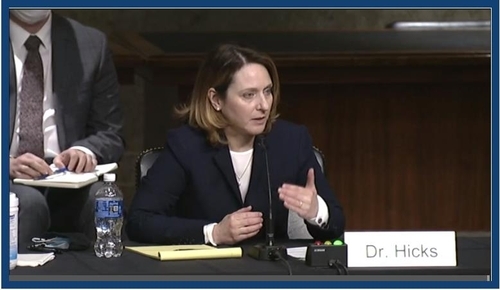 |
The captured image from the website of the US Senate Armed Services Committee shows Deputy Secretary of Defense nominee Kathleen Hicks speaking in her Senate confirmation hearing in Washignton on Tuesday. (US Senate Armed Services Committee) |
US alliances need to be understood from the strategic value they serve, instead of just how much it costs to maintain them, US Deputy Secretary of Defense nominee Kathleen Hicks said Tuesday.
The former deputy undersecretary of defense also said she expects President Joe Biden to place strategy at the center of US alliances.
"We should always be focused on burden sharing and assuring that allies fulfill their commitments," Hicks said in her confirmation hearing before the Senate Armed Services Committee.
She, however, argued the US has become "astrategic," allowing the burden-sharing issue to become a tactical issue that overrides the "strategic value of the alliances ... that the Chinese and Russians could only hope to match."
Her remarks follow years of efforts by the former Trump administration to push US allies to pay more for their joint defense.
For instance, the Trump administration had demanded South Korea pay $1.3 billion per year as part of the cost to maintain 28,500 US troops on the Korean Peninsula, which would mark an unprecedented 50 percent on-year increase for Seoul.
Seoul and Washington have been unable to renew their Special Measures Agreement since its expiration at the end of 2019.
Secretary of Defense Lloyd Austin has said he will quickly conclude the cost-sharing negotiations with Seoul as part of efforts to modernize US alliances in the Indo-Pacific.
"I'm very hopeful that President Biden, who has spoken eloquently on this issue, will make good progress in returning strategy to the center of our alliance relations," Hicks told the committee.
Pentagon press secretary John Kirby confirmed the new secretary's commitment to rebuilding the alliance.
"We are in the midst of taking a look at our force posture around the world and the contributions that we're making. So I'm not prepared to give you a specific answer," he said when asked what the new administration thought about the prolonged cost-sharing negotiations with Japan and South Korea.
"The only thing I would say writ large is that the secretary remains committed to reinvigorating our alliances and our partnerships around the world and our friendships because, as he said on Day One, nobody can do this alone," Kirby told a press briefing.
Hicks also underscored the importance of US alliances in serving the country's own interest.
"I believe that the alliance network that the United States maintains is of significant comparative advantage over competitors, and I think we should be pretty strategic about how we consider the allied perspective so that we advance that advantage," said Hicks.
One of the areas that US alliances serve the interests of both the US and its allies is its extension of US nuclear deterrence to allies, she noted.
"There are allies who very much rely on the United States as a nuclear assurance, and that helps dissuade their own internal dynamics that might look to develop nuclear weapons themselves. It helps dissuade that viewpoint. So I think it has a significant non-proliferation benefit to the United States by keeping countries that might otherwise pursue nuclear weapons from doing so," she said at the hearing.
Hicks served as principal deputy undersecretary of defense for policy in 2012 after working as a career civil servant at the department from 1993 to 2006.
If confirmed, she will be the first woman to serve as deputy secretary of defense. (Yonhap)





![[Exclusive] Hyundai Mobis eyes closer ties with BYD](http://res.heraldm.com/phpwas/restmb_idxmake.php?idx=644&simg=/content/image/2024/11/25/20241125050044_0.jpg)
![[Herald Review] 'Gangnam B-Side' combines social realism with masterful suspense, performance](http://res.heraldm.com/phpwas/restmb_idxmake.php?idx=644&simg=/content/image/2024/11/25/20241125050072_0.jpg)

